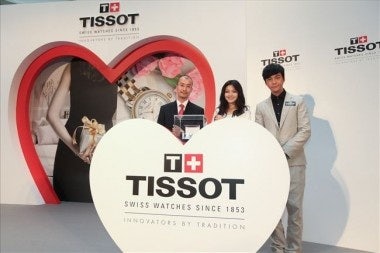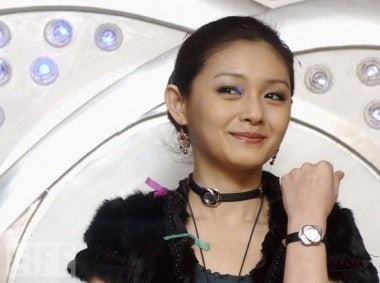Swiss Watchmaker Trying To Innovate To Tap Chinese Market#

Tissot's recent press conference celebrating Mother's Day in Guangzhou
While most well-known Swiss luxury watchmakers have benefited from China's intensifying love affair with everything horological, brands that don't quite have the visibility of Omega or Rolex are working overtime to get their names better known in the mainland China market. Recently, we saw this in Hublot's partnerships with the wildly popular blogger and F1 racer Han Han and actor (and brand ambassador) Jet Li, TAG Heuer's flashy ad campaigns featuring brand ambassador Chen Daoming, and Jaeger-LeCoultre's China-only Enamel Lotus watch.
Last weekend, in celebration of Mother's Day, Swiss watchmaker Tissot looked to catch up to its competitors with a press conference at Guangzhou's Tianhe Shopping Center featuring spokesmodel Barbie Hsu (大S). Tissot has made south and southwest China a major priority in its China expansion efforts, and last year opened a new store in Chongqing, one of the fastest-growing cities in southwestern China. Tissot has kept its bases covered in north China as well, debuting its Lady Heart watch earlier this year at Beijing's Oriental Plaza. With rivals like Patek Philippe, Blancpain, Longines and Hublot making lucrative gains in China, Tissot has its work cut out.
According to Tissot's website, the company defines itself as "Innovators by Tradition." So does Tissot see itself as an innovator in the fast-moving China market? Last week, Yao Zhongwei, Vice President of Tissot China, spoke to Sohu about the brand's efforts in appealing to Chinese consumers, and what sets the company apart from its deep-pocketed and well-pedigreed competitors (translation by Jing Daily team):
Sohu (S): Can you tell us a little about how you joined Tissot?#
Yao Zhongwei (YZW):#
I've been with Tissot for 11 years, and actually the reason I joined the company was because I like sports, especially swimming, and my watches always disappointed me. My old Japanese watch always failed in the water, and I thought if I had the opportunity, I'd like to visit a Swiss watch manufacturer, and I'd particularly like to join the Swatch Group if possible.
S: Compared with other Swiss watch brands, what are Tissot's advantages?#
YZW:#
Well, for one thing, Tissot is a brand with strong sports DNA. In China, we've had the English professional footballer Michael Owen as our spokesman since 1999. In the eyes of young Chinese consumers, Tissot is a dynamic, energetic and athletic brand. Recently, we signed the Chinese fencer and Olympic champion Zhong Man as our spokesman. In addition, Tissot has sponsored many international sports events, such as the CBA (Chinese Basketball Association).
S: You just mentioned Tissot's association with sports, but we feel that Tissot has not particularly emphasized this feature in the Chinese market.#
YZW:#
Yes. Tissot has various collections including our sports series, traditional classic series, fashion series and more upscale series. We've tried to increase our association with sports via our partnership with Michael Owen, and we're going to keep intensifying that association going forward. After 2006, we turned a lot more to fashion timepieces, signing [actors like] Barbie Hsu and Huang Xiaoming as spokespersons. However, this doesn't mean we're reducing our sports lines. We believe that Tissot has built a sporting image, and we want to increase our fashion imprint in addition to, rather than in spite of, that sports image.
S: So do you think Chinese consumers prefer fashion collections more than sports collections? Can you talk a little about the profile of Tissot's customers?#
YZW:#
As for the first question, in terms of sales, our sports series are our best sellers, followed by the more classic series.
In China, our customers are relatively young, with most buyers between the ages of 25-35. They focus on watch quality more than anything, and tend to prefer classic, mechanical and round watches. Although sportier and more active customers often like our sporting lines as a way to express their personalities.
S: What are the three most important decisions that Tissot made after entering the Chinese market?#
YZW:#
First of all, we used spokespersons. Second, we opened branded stores. Third, we increased R&D investment for the T-Touch series.

In China, Tissot uses popular local spokespersons, such as Taiwanese celebrity Barbie Hsu
S: Can you tell us a little about Tissot's strategy of signing local celebrities as spokespersons?#
YZW:#
It's effective because they can more easily attend our events. In the past, for example, in the case of Michael Owen, he was not able to come to China very often for promotional events. Also, partnering with local celebrities helps because they're more recognizable and help foster a feeling of familiarity among local consumers.
S: What's the biggest challenge that Tissot has encountered in China?#
YZW:#
The biggest challenge has been balancing the needs of Chinese consumers and developing trends in the global watch market. In 2005, one of our popular European pieces encountered an issue in the China market because it just didn't work among Chinese consumers. Since then, every time we launch a new piece, we always take the needs of Asian markets into account. Whenever we launch a new European series, we also launch a global series. New product development (NPD) in the Chinese market is always a big challenge for us.
S: Nowadays, many brands are using new media for promotion and marketing. How does Tissot view this trend? How do you select network partners in terms of marketing and communication?#
YZW:#
It's a constant learning process. Although new media is a very new area, it's an inevitable trend. Tissot has an official Facebook page, and now have hundreds of thousands of fans on that page. Among watch brands, we have the largest number of Facebook fans. In China, we've collaborated with several online media sources and launched a number of online advertising campaigns. However, I think the process of turning to new media has been relatively slow. We're going to speed this up and increase investment in this area, as we've seen a lot more young people use new media to learn more about our watches.
S: We know that the prices of luxury goods are increasing year after year. What's Tissot's pricing strategy?#
YZW:#
Our pricing strategy is based on costs. If material costs go up, the price of our watches will go up. Many luxury brands price based on their image, or inflation, or consumer purchasing power, but we don't. Recently, we've had to raise prices for our 18K gold watches, due to the increasing cost of gold. However, prices for our stainless steel watches will remain the same. I think this is one of our advantages.